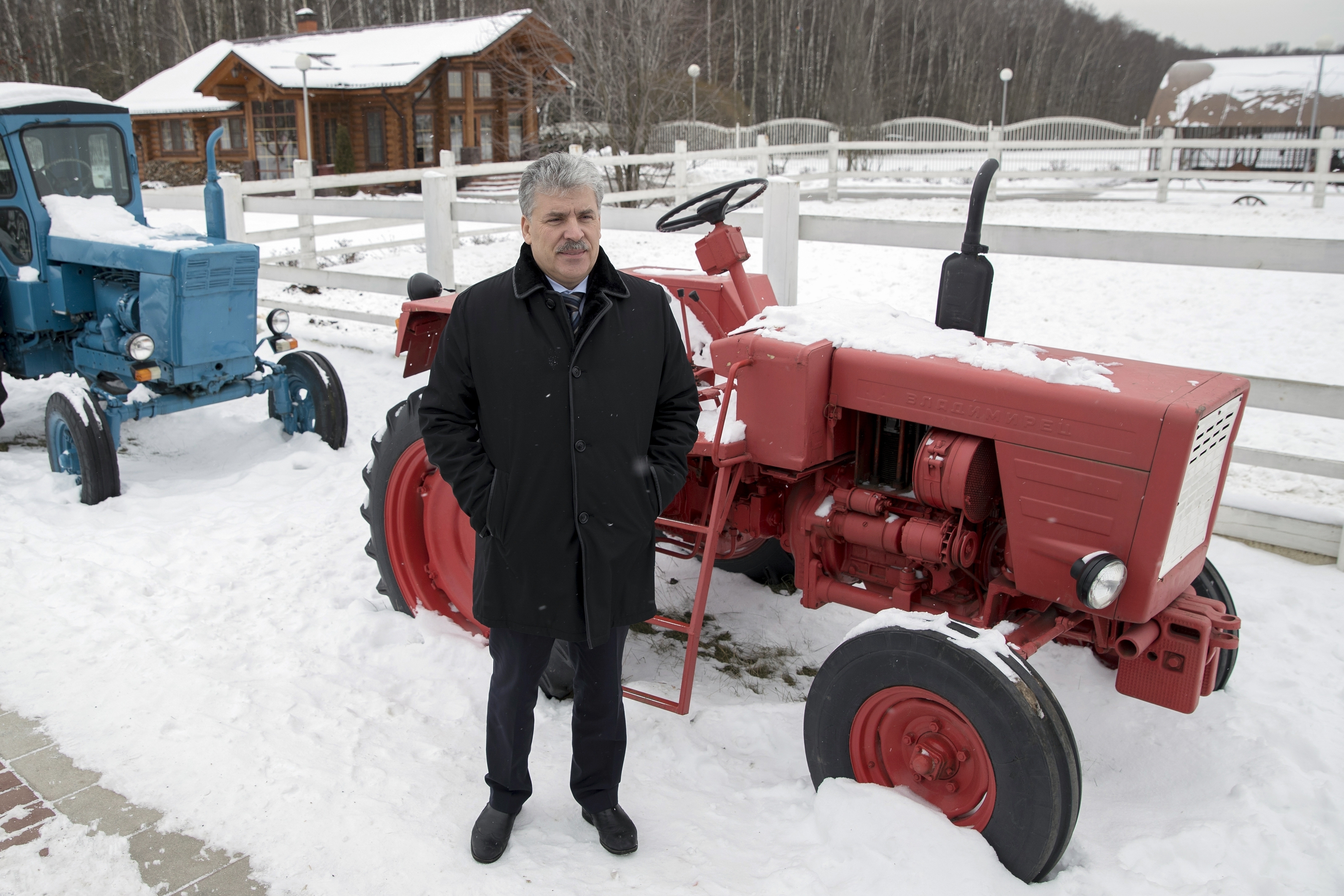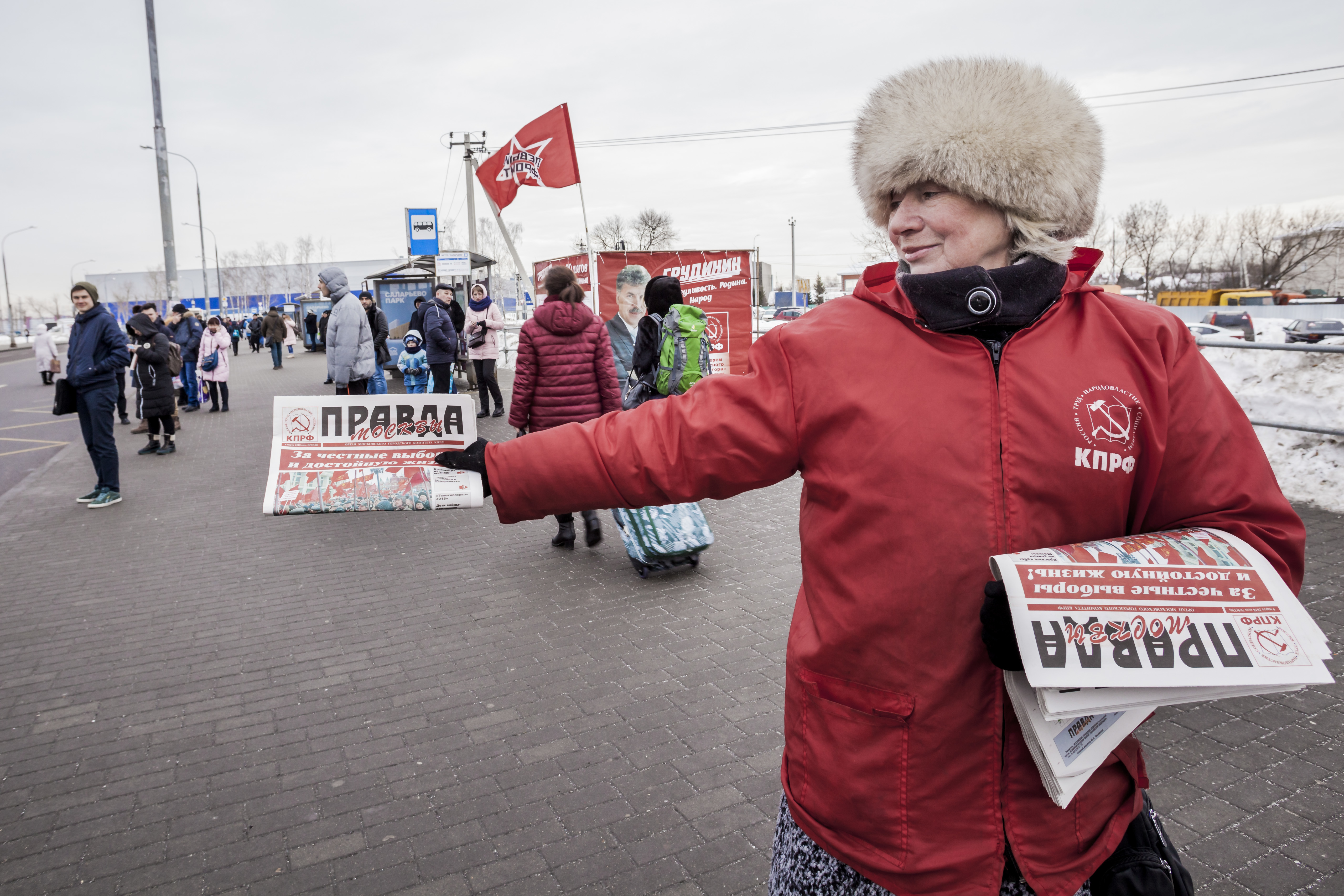Officially securing 77 percent of the vote, Vladimir Putin easily soared to victory, winning his fourth term as Russia’s head of state. With nearly all votes counted, the Central Election Commission said that in a distant second place was Pavel Grudinin, candidate of the Communist Party of the Russian Federation (CPRF), successor to the former ruling party of the Soviet Union.
Grudinin, who’s vote total amounted to a mere 11.9 percent, has publicly denounced the poll as the “filthiest” election in recent times. Video footage surfaced from multiple voting sites, including in the central city of Kemorovo and Karachay-Circassian Republic in the Caucusus, showing poll workers apparently blocking the view of surveillance cameras while others fill ballot boxes with stacks of papers.
How widespread such activities may have been is unknown at this time. Election observers from the Organization for Security and Cooperation in Europe (OSCE) are scheduled to release a report on the vote sometime early this week. Monitors from OSCE noted in 2012, however, when Putin won re-election with 63 percent, that the vote was “clearly skewed” in his favor, with the abuse of government resources and the hampering of opposition candidates guaranteeing the outcome.
With Russia’s economy faltering, Putin focused his presidential campaign on international affairs and raising the country’s status as a player in world politics. During his first two terms in office, his popularity was largely rooted in the perception that he had restored economic prosperity and rescued Russia from the chaos and public resource sell-off that occurred under former president Boris Yeltsin following the dismantling of the USSR.
But with the decline of world oil prices and the imposition of EU and U.S. sanctions in response to the annexation of Crimea triggering a two-year contraction, Russia’s economy has only recently begun to grow again. But even with a modest recovery and the reigning-in of inflation, the country has not yet been able to regain the GDP growth rates that characterized the early years of Putin’s rule.
Rather than talk about miniscule economic expansion, disappearing jobs, and declining social services, Putin instead spent the campaign talking up Russia’s role as a global power. From Syria to Ukraine, he had plenty of examples to show that the U.S. and other major states can no longer ignore Russia as they did in the 1990s, something for which he reminded voters to give him credit.
It is precisely the declining economic situation, however, which should have created an opening for Grudinin and the Communists. The country continues to be plagued by a lack of investment in the core fundamentals of its economy outside of oil: slow automation and stunted technological updates in industry, an aging and shrinking workforce, outdated infrastructure, and ongoing corruption are putting Russia at a disadvantage on the international market. And public spending levels for healthcare and education continue to be low.
For the past four years straight, household income has been sliding, with more and more working-class Russians feeling the pinch. Officially, the poverty rate is 14 percent, an increase of 3 percentage points since 2013. But critics believe the real rate is considerably higher. The uneven regional development in Russia also means that while some glittery cities like Moscow are full of billionaires, the poorer regions could be in serious decline.
This situation is exactly what the CPRF had hoped would propel Grudinin to score better in this election than the Communist norm of 15 percent. Gambling on the potential of a campaign rooted in socialist populism, the CPRF opted not to again nominate its aging leader and four-time previous candidate, Gennady Zyuganov.

Communist Party candidate for the 2018 Russian presidential election Pavel Grudinin posea for a picture with old made Soviet tractors outside Moscow, Russia, Jan. 26, 2018. (AP/Pavel Golovkin)
Grudinin, who is not even a member of the Communist Party, has established a reputation for himself in recent years as a truth-teller, someone not afraid to criticize the policies of the Putin government (if not Putin himself). Previously a regional legislator for Putin’s United Russia party, Grudinin bolted from the president’s political outfit after it failed to nominate him in his district. He reportedly tried to ally himself first with the ultra-nationalist Liberal Democratic Party of Vladimir Zhirinovsky before settling on Zyuganov and the CPRF.
In addition to his populist image among the younger generation (YouTube videos of his speeches garner hundreds of thousands of views), Grudinin also held some symbolic appeal for the traditional CPRF base who still nostalgically remember the socialist system of the Soviet Union. He is the director of an enterprise that was known as the Lenin State Farm, a Soviet-era agricultural collective located just outside of Moscow. Grudinin became the majority shareholder when the Lenin Farm was privatized in 1995, but his connection to this Soviet past was played up heavily by the CPRF to prove the candidate’s “red” credentials.
During his time as head of the farm, Grudinin became a millionaire (possibly billionaire), making sweet profits from strawberries. The nomination of someone with such bourgeois status had many left-wing critics of the CPRF, as well as many of its allies, scratching their heads. That a CEO who became wealthy from his holdings in what was formerly a public enterprise and who was previously a member of Putin’s party could be selected as the standard-bearer for the Communists left many wondering what politics were coming to in Russia.
Taking a chance on Grudinin got the CPRF some much-needed press coverage and did hold onto its ranking as the first-place opposition party, but there was little real pay-off at the ballot box. The masses of Russian workers did not rally to the party that still bills itself as the working-class vanguard. Even if election tricks suppressed his total somewhat, Grudinin’s official tally is probably not far off from what he actually earned. He failed to best Zyuganov’s 2012 showing of 17.2 percent.
The other challengers to Putin split the remaining small number of votes among themselves, with Zhirinovsky coming third with 5.7 percent, liberal television host Ksenia Sobchak 1.7 percent, and the remainder scoring 1 percent or less each.

A Communist Party supporter gives pamphlets in the streets of Moscow, Russia, on 14 March 2018 during the presidential campaign of Russia 2018. (Photo by Celestino Arce/NurPhoto/Sipa/AP)
Missing from the race, of course, was Putin critic and Western media darling Alexei Navalny. Known for organizing anti-Putin rallies centered on allegations of corruption, Navalny was barred from running by election authorities in December based on a previous embezzlement conviction, seen by some as a political frame-up. Though lauded by a number of Putin opponents in the West, Navalny is no progressive. For years, he has been associated with and has led extreme Russian nationalist and ethnic chauvinist parties and organizations.
So with the opposition parties ideologically divided and none of them coming out of this election any stronger than they were going in, Putin begins his new term without any meaningful political challengers. Despite the country’s ongoing economic instability and its tense relations with other countries—over issues ranging from election tampering to clandestine poisonings to military confrontation—Russia remains, for now, tightly in the grip of Vladimir Putin.
Top Photo | Russian President Vladimir Putin speaks to supporters during a rally near the Kremlin in Moscow, Sunday, March 18, 2018. (AP/Pavel Golovkin)
C.J. Atkins is the managing editor at People’s World. He holds a Ph.D. in political science from York University in Toronto and has a research and teaching background in political economy and the politics and ideas of the American left. In addition to his work at People’s World, C.J. currently serves as the Deputy Executive Director of ProudPolitics.
People’s World is licensed under a Creative Commons Attribution-NonCommercial-ShareAlike 4.0 International License.
The post Following Putin’s Landslide Victory, Opposition Candidate Calls Election “Filthy” appeared first on MintPress News.

